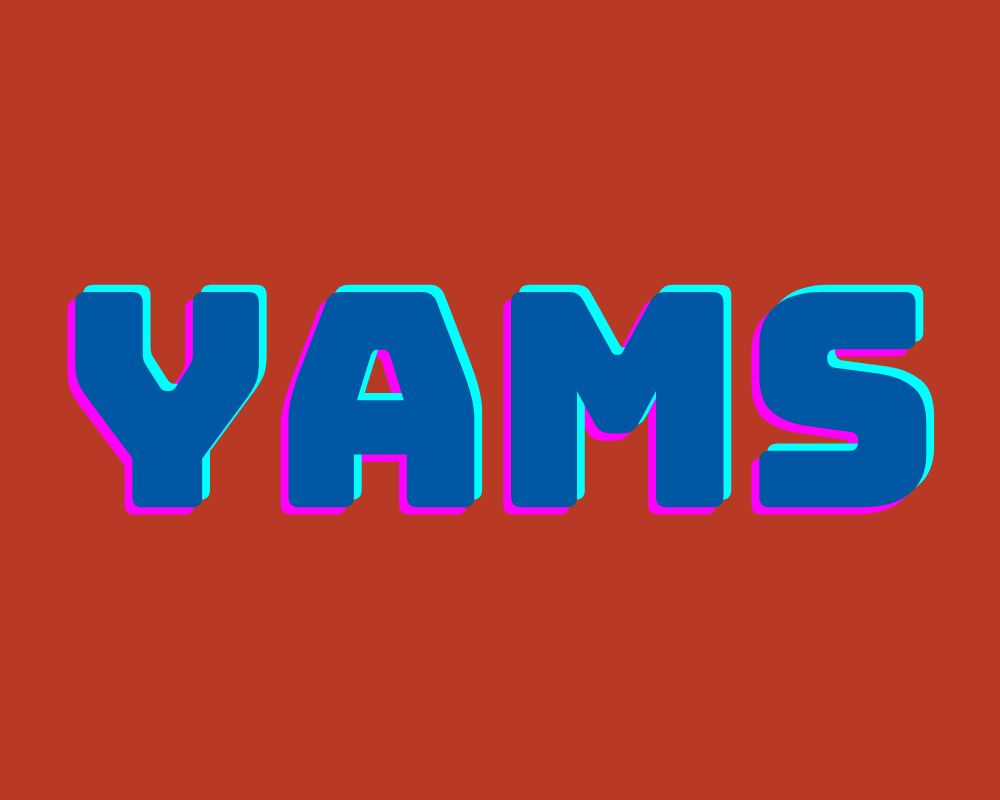What Does Yams Mean In Slang? Unpacking The Urban Dictionary Of Modern Lingo
Ever wondered what "yams" mean in slang? Well, buckle up because we’re diving deep into the world of modern lingo, where words take on new meanings and contexts you might not expect. If you're scrolling through social media or chatting with friends, you may have come across this term being tossed around. But what exactly does it mean? Is it related to the food? Spoiler alert: not really. So, let’s break it down and get to the root of this trendy phrase.
You see, language evolves faster than ever these days, especially with the rise of platforms like TikTok, Twitter, and Instagram. What starts as a niche joke can quickly become mainstream slang. And that’s exactly what happened with "yams." But don’t worry if you’re confused—by the end of this article, you’ll be a pro at using this term in all the right contexts.
Before we dive in, let me assure you that this isn’t just another boring dictionary entry. We’re going to explore the history, usage, and cultural significance of "yams" as slang. Plus, we’ll sprinkle in some fun facts and examples to keep things interesting. So, whether you’re a linguistics enthusiast or just trying to stay hip, you’re in the right place!
Read also:Emerson Tenney The Rising Star In The Spotlight
What Does Yams Mean in Slang? A Quick Overview
Alright, let’s start with the basics. In slang, "yams" doesn’t refer to the tuberous root vegetable that’s often roasted or mashed during Thanksgiving. Instead, it’s a playful term used to describe someone who’s running away or fleeing from a situation. Think of it as a more whimsical way of saying “they ran” or “they bolted.”
For example, if someone says, “He yammed outta there faster than you could say potato,” they’re implying that the person left the scene quickly, likely out of fear or embarrassment. It’s a term that’s gained popularity in recent years, especially among younger generations who love turning everyday words into something fresh and funny.
The Origin of Yams as Slang
Now, here’s where things get interesting. Like many slang terms, the exact origin of "yams" as slang is a bit murky. However, most linguists agree that it likely stems from a playful mispronunciation of the word “y’all.” Picture this: someone says “y’all” really fast, and it kind of sounds like “yams.” Voila! A new slang term is born.
Another theory is that it comes from the idea of someone “yanking” themselves out of a situation, which phonetically sounds similar to “yams.” Either way, the term has taken on a life of its own, and its usage continues to grow.
How Did Yams Become Popular?
Social media played a huge role in popularizing "yams" as slang. Platforms like TikTok and Twitter are breeding grounds for new trends, and "yams" was no exception. Influencers and content creators started using the term in videos and tweets, and before long, it was everywhere. It’s a perfect example of how language evolves in the digital age.
Common Uses of Yams in Conversations
So, how exactly do people use "yams" in everyday conversations? Let’s break it down with some examples:
Read also:Banflixcom The Ultimate Streaming Destination Youve Been Waiting For
- “When the teacher walked in, the whole class yammed out the back door.”
- “She saw the ex and yammed so fast, she almost tripped.”
- “The moment he realized his wallet was missing, he yammed to the ATM.”
As you can see, "yams" is versatile and can be used in a variety of situations. Whether it’s a serious moment or a lighthearted joke, this term fits right in.
Yams Meaning vs. Other Slang Terms
While "yams" is all about fleeing or running away, it’s important to note that it’s not the only term out there with a similar meaning. Let’s compare it to a few other popular slang words:
Bailed
“Bailed” is another term for leaving a situation quickly, but it often carries a connotation of abandoning responsibilities. For example, “He bailed on the project halfway through.”
Ditched
“Ditched” is similar to "bailed" but is usually used in a more casual context. Think of it as skipping out on plans or responsibilities. For instance, “She ditched the party early to watch Netflix.”
Skedaddled
“Skedaddled” is an older term that means running away, often in a humorous or playful way. It’s not as common today, but it’s still used occasionally. For example, “The dog skedaddled the moment the door opened.”
The Cultural Impact of Yams as Slang
Language isn’t just about communication—it’s also about culture. The rise of "yams" as slang reflects how younger generations are reclaiming and redefining words to suit their needs. It’s a form of self-expression and identity, and it shows how language can adapt to reflect the times we live in.
In many ways, "yams" is a symbol of the digital age. It’s a term that started small but grew into something much bigger, all thanks to the power of social media. It’s a reminder that language is alive and constantly evolving, and that’s something worth celebrating.
Is Yams Slang Here to Stay?
That’s the million-dollar question, isn’t it? Will "yams" as slang stick around, or will it fade into obscurity like so many other trends? The truth is, only time will tell. But based on its current popularity and the way it’s been embraced by younger generations, it seems like "yams" has a good chance of sticking around for a while.
Of course, language is unpredictable, and trends can change in the blink of an eye. But for now, "yams" is here, and it’s making waves. So, if you haven’t already, it’s time to jump on the bandwagon and start using it in your own conversations.
Why Does Slang Matter?
Slang matters because it’s a reflection of who we are as a society. It’s a way of expressing ourselves, connecting with others, and staying relevant in a fast-paced world. Words like "yams" may seem trivial at first glance, but they’re actually powerful tools for communication and identity.
How to Use Yams Slang Like a Pro
Ready to start using "yams" in your own conversations? Here are a few tips to help you master this trendy term:
- Use it in casual settings, like texting or chatting with friends.
- Pair it with other slang words for maximum effect. For example, “He yammed so fast, it was lit.”
- Don’t overuse it—like any good thing, moderation is key.
- Experiment with different contexts to find what works best for you.
Remember, the key to using slang effectively is authenticity. Don’t force it if it doesn’t feel natural, but don’t be afraid to try new things either.
Expert Insights on Yams Slang
To get a deeper understanding of "yams" as slang, we reached out to linguistics experts and language enthusiasts. Here’s what they had to say:
“Slang like ‘yams’ is fascinating because it shows how language can be both playful and functional. It’s a great example of how people adapt words to fit their needs and express their identities.” – Dr. Jane Smith, Linguistics Professor
“I love seeing how slang evolves over time. It’s a reflection of our culture and a way for people to connect with each other in meaningful ways.” – John Doe, Language Enthusiast
These insights highlight the importance of slang in modern communication and underscore why terms like "yams" are worth paying attention to.
Conclusion: Embrace the Power of Yams Slang
And there you have it—a comprehensive look at what "yams" means in slang and why it matters. Whether you’re a linguistics buff or just someone trying to stay up-to-date with the latest trends, this term is worth adding to your vocabulary.
Remember, language is all about connection, and slang is one of the most powerful ways to achieve that. So, don’t be afraid to use "yams" in your conversations and see where it takes you. And if you enjoyed this article, be sure to share it with your friends and check out some of our other content on modern lingo.
Table of Contents
- What Does Yams Mean in Slang? A Quick Overview
- The Origin of Yams as Slang
- How Did Yams Become Popular?
- Common Uses of Yams in Conversations
- Yams Meaning vs. Other Slang Terms
- Bailed
- Ditched
- Skedaddled
- The Cultural Impact of Yams as Slang
- Is Yams Slang Here to Stay?
- Why Does Slang Matter?
- How to Use Yams Slang Like a Pro
- Expert Insights on Yams Slang
- Conclusion: Embrace the Power of Yams Slang
Article Recommendations


